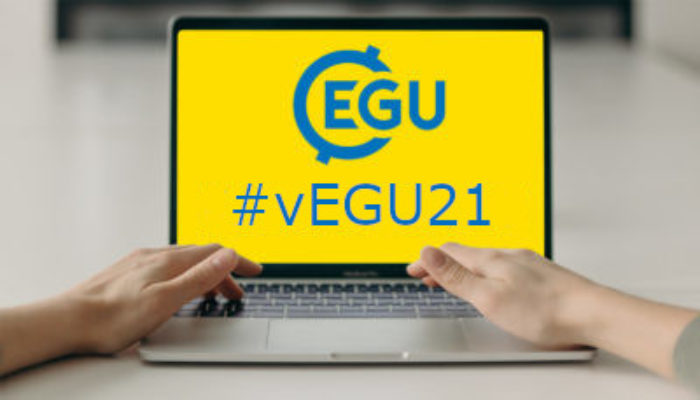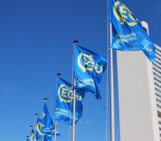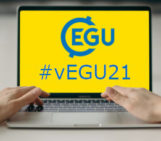
The program and general advice
TS attendees can use their Personal Program to organise all sessions of interest, as in any EGU General Assembly. Entire sessions or individual abstracts can be added to keep track of your most important topics by clicking the yellow star next to the abstract or session. Aside from the regular sessions, there is also the usual range of Union Symposia and Great Debate live sessions and a fair number of short courses. The schedule is the same for the 10 days of the meeting, and runs between 09.00 and 17.00 CEST in four time blocks. Times are listed in CEST, and attendees can import their personal program to a calendar at their time zone with an ics link.
We want to highlight that virtual events are tiring to attend, and provide a few guidelines that can be all embraced as “be kind to yourself and ruthless to the schedule”. Where possible, focus only on attending the conference, just as you would if you were in Vienna. Once you have added your key sessions and abstracts, consider adding some variety to your program to change your mind focus with some more relaxed activities. You can attend pop-up networking events, ECS and division-wide social events, and short presentations by Artists (not) in Residence. Try not to attend more than one session simultaneously. Take regular breaks and take the weekend off. And again, be conservative with adding events to your calendar and ruthless if you need to cut some out
For more information, visit How to vEGU: balancing the schedule and your personal programme with caring responsibilities
Networking tools to engage, socialise, and learn
When you log in to the vEGU21 platform – Copernicus Office area, you’ll find that new options are available, the vEGU21 Profile, the Network tool, and the pop-up event scheduler.
vEGU21 Profile. The Profile page is in the upper left area, just below your name. It has all the personal data of your account for you to select how much of that is publicly visible; your affiliations, interests, division choice, policy and outreach interests, as well as your key values and interests, and even stickers, and more importantly, options to add your pronouns.
Conference Networker. The Conference Networker is a peer-to-peer networking platform that will help you find, meet, and talk with other attendees at the conference. During the General Assembly, the Networker can help you find other members with similar interests. You can share your profiles with people you meet at the conference, or start group text chats with other members in your network. Moreover, you’ll be able to keep in contact, maintain connections and make new ones throughout the rest of the year! To use the Networker you have to request adding your contacts to your profile, by means of the email addresses they have registered with Copernicus. Once they accept, you can invite them to a private chat or even set up group chats with specific groups of people!
Handshake function. Provides a quick way to build your network during the two weeks the meeting is live. The Handshaker function lets you make contact with other attendees that are in the same virtual conference room and share your profile or start a text chat. Clicking on the Handshaker allows you to see who else is present in the same virtual space and invite them to be in your network. This proximity-based tool will allow you to discuss ongoing topics with new collaborators or have serendipitous catch-ups!
More information on the conference profile, networker, and the handshake tool at How to vEGU – Networking (part 1): your vEGU21 Profile and the conference Networker
Pop-Up Scheduler. Lets attendees organise their own networking events at the EGU General Assembly on their chosen platform. This tool works for events of any kind and any size. From small, focused events on particular scientific quirks or intriguing phenomena, to building a community to sharing an inspiring documentary, demonstrating your science, or catching up with colleagues. The pop-up scheduler can be accessed by logging into the vEGU21 platform. It’s flexible, and organizers can link it to any platform: Skype, Zoom, Google meet, Gathertown… and many more!!
The networking events of the TS division will take place in Gathertown, a virtual networking platform that uses a proximity-based approach. After creating a customizable virtual avatar, participants can interact with a virtual environment and with other participants much like they would be in real life! Nearing other avatars activates the video and audio functions and allows the interaction with other participants, while walking away deactivates them. Getting closer to objects make them seen and actionable (by pressing X). Gathertown thus helps simulate real-world interactions not possible on other platforms and provides attendees more agency over who, when, and how they interact with one another!
More information on the pop-up scheduler at How to vEGU – Networking (part 2): the pop-up networking scheduler!
And make sure to also check other great activities like What’s on at vEGU21: #ActualLivingScientist and Whats on at #vEGU21: getting creative with the Kids Art activity!
Code of conduct
All vEGU21 attendees are expected to treat each other with basic courtesy, and with an open and respectful conduct, based on basic politeness. Diversity and equality are essential values to ensure an ethically correct and respectful approach to scientific dissemination, and are essential to avoid misconduct, including the unethical and/or biased treatment of people, as well as discrimination, harassment, bullying, coercion, intimidation, censorship and plagiarism.
To prevent misconduct during vEGU21, we recommend that any case of misconduct be promptly reported. To report conduct violations, please contact the General Assembly programme committee chair at programme.committee@egu.eu and/or send an email to conduct@egu.eu. Messages to this address are treated confidentially and are only read by the EGU president and EGU’s person of trust. Appropriate actions will be taken where necessary.
For more info, check How to vEGU: The EGU Code of Conduct




